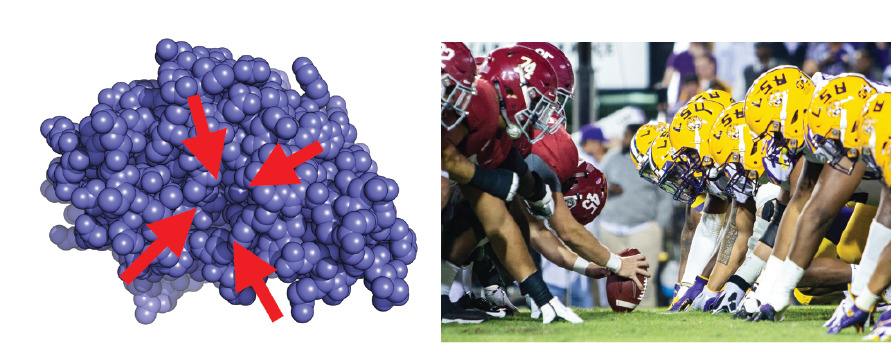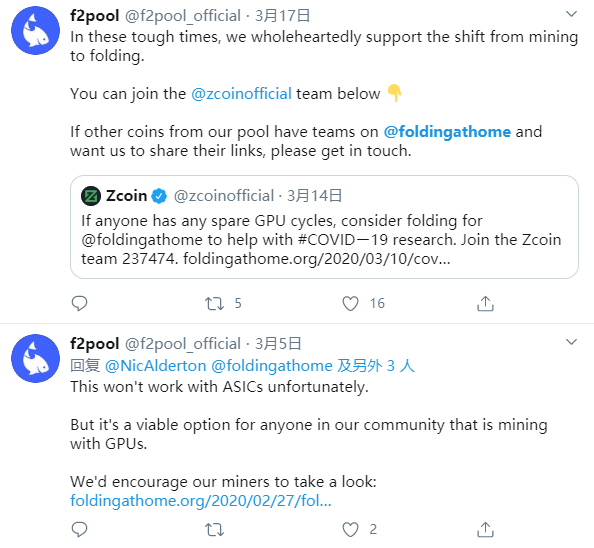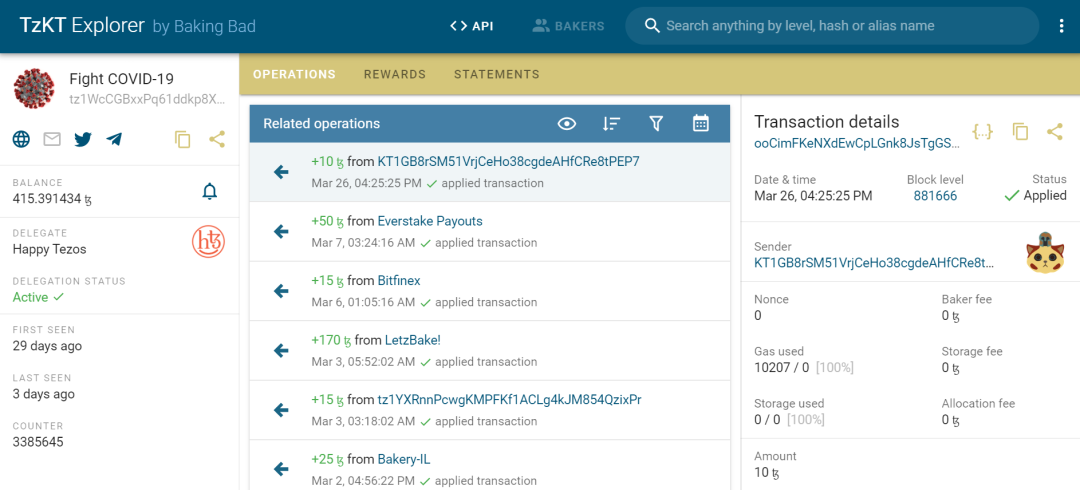Research PoW mining to find out: why crypto miners may become the new killer virus killer

New crown virus is still raging around the world, and all walks of life are actively participating in the fight against the epidemic. In the blockchain industry, the chain circle actively develops related platforms to help trace the epidemic prevention materials on the chain; it has not found a "sphere of use" in the mining circle, but has recently started to act, contribute computing power, and look for potential cures for viruses.
The project called Folding @ home launched a cooperative program on March 15 to allow miners around the world to help simulate the dynamic changes in the protein of the new crown virus by contributing their own computing power to find potential treatments for the virus.

- Bitcoin Liquid sidechain exceeds public Lightning Network channels in the number of BTC held
- The data shows that the probability of BTC breaking through 10,000 in June is only 16%. Do you believe it?
- Research report | When the blockchain meets the sharing economy, what kind of spark will it collide with?
Can mining help find new crown virus therapies?
In fact, Folding @ home was officially launched as early as October 1, 2000. It is a distributed computing project that studies protein folding, misfolding, aggregation, and related diseases caused by it. The Pande team at the Stanford University Department of Chemistry Host.
Viruses also contain proteins that suppress our immune system and reproduce themselves. To go deeper into new coronaviruses, you need to know how these viral proteins work and how to design therapies that stop them. There are many other experimental methods for determining protein structure. Despite their power, they can only show a single snapshot of the daily shape of a protein. And protein has a lot of moving parts. Folding @ home's expertise is the use of computer simulations to study the moving parts of proteins , thereby capturing valuable information that is not accessible in any other way.

In fact, it's not just the new crown virus, Folding @ home has initiated many similar projects. For example, no small progress has been made in the fight against Ebola. Therefore, this initiative is likely to help find valuable therapeutic solutions for the new crown virus, and it has become a hot topic in the cryptocurrency mining circle.
However, understanding the process of protein activity requires a huge amount of computing power to run the simulation program. Therefore, external forces are needed to help. After all, "everyone picks up firewood and flames." The Pande team said: "If we get 100,000 GPUs, the computing power will increase 5-10 times."
Folding @ home said in this official announcement against coronavirus: Every simulation program you run is like a lottery ticket. The more lottery tickets we buy, the greater the probability of winning .
It is clear that the PoW cryptocurrency mining pool will be the ideal volunteer for the Folding @ Home project. Under the PoW consensus mechanism, the accounting right of the blockchain is directly proportional to the computing power of the miner node, that is, the stronger the computing power, the greater the probability of mining.
Although the early mining period through the computing power of personal computers has passed, and ASIC mining machines that monopolize bitcoin computing power cannot participate, GPU mining equipment also has strong computing power, and there are still many GPU miners on Ethereum. This will be a valuable resource for Folding @ Home. You know that Ethereum is basically the largest source of GPU computing power on the planet. At the same time, if Bitcoin miners have idle old GPU mining equipment, they can also participate in contributing computing power. And some small miner miners can participate as long as they meet the requirements.
In addition, due to the recent collapse of the stock and crypto markets, the mining power cost of Bitcoin or Ethereum for small mines or private cryptocurrency miners currently exceeds the revenue they can generate, so many crypto miners have a lot more Idle computing resources can be invested in the activities of Folding @ home.

Which blockchain projects have participated?
Gregory Bowman, director of Folding @ Home, revealed in a recent Reddit AMA that the project currently has 400,000 computers contributing to research. He said: "We had about 30,000 users before the new crown virus pandemic began. Over the past two weeks, 400,000 volunteers have joined Folding @ Home." Folding @ Home has four donors Increased by 1200% in a week. At present, many projects in the upstream and downstream industries of cryptocurrency mining have joined this campaign against the new crown virus.
Coreweave, the largest Ethereum (ETH) miner in the United States, has transferred about 6,000 GPUs. Coreweave's CTO estimates that the donated resources are equivalent to 0.2% of the total power of Ethereum. These computing powers can earn 28 ETH every day. However, Coreweave doesn't care about these losses, but hopes that these GPU computing power can help find a solution to the new crown virus.
Coreweave co-founder Brian Venturo said that when he first heard about Folding @ Home's plan, he decided to support it without saying a word. In fact, they immediately set up a test net and ran it within minutes. Coreweave has now shared half of its computing power with New Crown Virus Research .
The bitcoin mining giant fujipool f2pool spared no effort to promote the event in the community. Earlier, Yuchi tweeted: "Although ASIC miners cannot participate, any member of the community can use GPUs to participate in mining. We recommend miners to take a look at the Folding @ home activity." Zcoin was then reprinted. Twitter on idle computing resources and commented: "During this difficult period, we wholeheartedly support the transition from mining to 'folding'. You can join the Zcoin team. Our mining pool team participated in the Folding @ home project , Please contact us if you would like us to share a link to the event. "
At the same time, the blockchain platform Tezos community decided to encourage users to contribute their idle computing power to the medical research of New Crown Virus. Its developer Johann Tanzer has organized a prize pool and has accumulated about 415 XTZs. The validator LetzBake contributed about half of the amount, and the rest was donated by some individuals. The prize pool is expected to grow in value over time. After the launch of this event, everyone's enthusiasm exceeded expectations. About 20 groups of Tezos miners began to contribute their own computing power. Tanzer said he will award the award to the best performing team on March 30, and he promised that the value of the award will be about 15 XTZ. The fight against the new crown virus has also come to the field of chips. U.S. GPU chip maker Nvidia has made a proposal asking all users to use their computer resources to help fight the corona virus. Nvidia also called on other gaming industry companies to join this Folding @ home, such as Steel Series, NZXT and Razer, Intel Gaming and MSI also responded to NVIDIA posts on Twitter. Although the invitation is for gamers, due to the large number of technical and hardware resources used for mining, cryptocurrency miners can also participate in the proposal. There are also other cryptocurrency projects participating in the Folding @ home plan, such as BitCash, which establishes a reward pool for miners participating in contributing examples, and decentralized computing network Golem, which directly donates to the plan. Curecoin (CURE) and Foldingcoin (FLDC) for continuous rewards … Some of these cryptocurrency projects have directly abandoned mining revenues, and instead invested computing power in the simulation of viral protein activities in an attempt to save millions of lives ; some directly donated to Folding @ home to support their software and hardware Development and maintenance as well as experimental testing; some mobilize more community members to participate through innovative incentive mechanisms; and many projects appeal to people to participate in this cause through their own influence. In the face of challenges facing all humankind, crypto consensus has reached unprecedented consensus. 


Is PoW mining feasible?
Someone on Reddit put forward a bold idea to develop a cryptocurrency that can solve scientific research problems while mining.
The Pande group, who hosts Folding @ home, says: It's much harder than it looks. "The ideal situation is to design a PoW mechanism useful for scientific research. Doing this is challenging because what we care about must be difficult to calculate but easy to verify." It seems impossible to trade Folding @ home participants Complete the work of each unit and give them the corresponding monetary value, because there is no function that supports transaction verification and tracking like the blockchain browser. Therefore, it is difficult to combine the following three factors-scientific relevance, computational difficulty and easy verification. The Pande team said: "The last two can be done through hashing, the first two can be done through our research. But verification is difficult." The problem with projects like Folding @ home is that incentives are long-term and harder to quantify . In contrast, the returns of cryptocurrency miners are tangible and frequent. Humans like quick, simple rewards . The Stanford University team tries to motivate participants to complete each unit of work through points. It invites people to create teams and compete with each other on a global scale, much like Bitcoin mining. Although they did so long before Satoshi Nakamoto wrote the Bitcoin white paper, we can still compare this method to a mining pool. However, there is currently no good way to combine people's pursuit of profit with protein research. Some people think that advanced mining software should be developed, which allows users to allocate GPU processing time between cryptocurrency mining and projects like Folding @ home. Then, they can use the GPU to do good deeds while mining. Judging from the current situation, the users and institutions participating in Folding @ home are still using love to generate electricity , but isn't that also the essence of charity? While major cryptocurrency projects with huge computing power, resources and other conditions take the lead in participating in this new global epidemic of pneumonia, as ordinary people, in fact, they can also contribute to the computing power of the equipment around them. Just like the literal Chinese translation of "Folding at Home (Protein)" at Folding @ home, as long as you have GPU computing power, even if it is only a tiny bit, it can easily help scientists at home. It may be because of your contribution that you have liberated all mankind from the bitter sea of epidemics. It's exciting to be able to participate in this great cause. 
We will continue to update Blocking; if you have any questions or suggestions, please contact us!
Was this article helpful?
93 out of 132 found this helpful
Related articles
- Shanghai court first explores the use of blockchain certificate technology, and 10 court trial trial record reforms started in April
- The blockchain industry's air outlet is reappearing: dozens of institutions quietly lay out the Shanghai Lingang Free Trade Zone, and the four provinces are intensively issuing policies to grab the "track"
- Perspectives | Ethereum 2020: Roadmap and Outlook
- Opinion | Wang Qian of Jilin University: The Central Bank will definitely face fierce competition between private and fiat currencies in the future
- Prediction | Data show that the probability of BTC breaking 10,000 by June is only 16%
- Embarrassing or strange new narratives: Bitcoin is to money, like 0 to mathematics
- Industry Blockchain Weekly News 丨 Listed companies enter annual report season, blockchain becomes a key word




